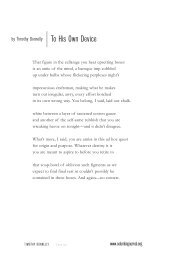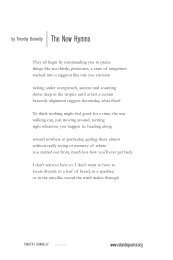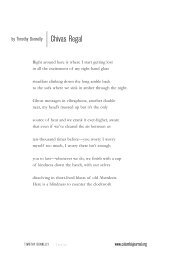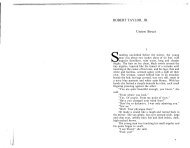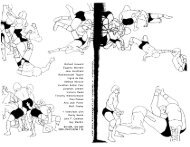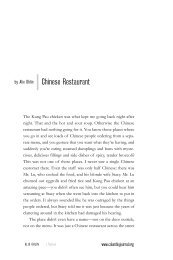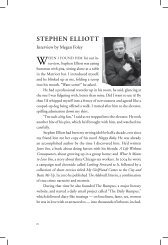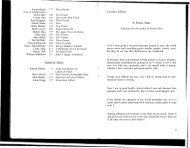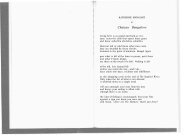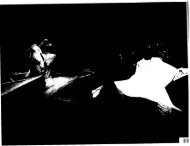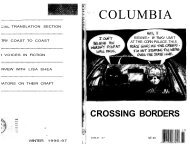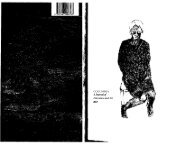Issue 42 - Columbia: A Journal of Literature and Art
Issue 42 - Columbia: A Journal of Literature and Art
Issue 42 - Columbia: A Journal of Literature and Art
You also want an ePaper? Increase the reach of your titles
YUMPU automatically turns print PDFs into web optimized ePapers that Google loves.
the room <strong>and</strong> see what everyone's thinking? I am more cominitted to<br />
being faithful to what I feel is good writing <strong>and</strong> a true sentence <strong>and</strong><br />
writing about the things that matter than I am to any particular form<br />
or format. I don't want to make fast food. There's nothing wrong<br />
with fast food - I eat it, I just don't want to make it. I feel it's very<br />
hard to write a really good book with no heart. There's that great line<br />
<strong>of</strong> John Gardner's in which he says the sin <strong>of</strong> 19th-century literature<br />
is sentimentality, whereas the sin <strong>of</strong> modern literature is that it has no<br />
heart. To me the besetting sin now is a mixture <strong>of</strong> sentimentality <strong>and</strong><br />
irony the worst <strong>of</strong> both worlds. You read some <strong>of</strong> this stuff <strong>and</strong><br />
you go: Oh my God, so let's see, it's all about you <strong>and</strong> how Inuch<br />
you are better than everybody around you, but you don't want anybody<br />
to think that so you write in a really self-deprecating way but<br />
with enough irony that it will be apparent to us that the point <strong>of</strong> this<br />
is poor me. I'd rather read Little Dorrit. Or something with a great antihero<br />
like The Eustace Diamonds. She [Lizzie GreystockYs just bad to<br />
the bone, but Trollope actually sympathizes with her. And she's not<br />
bad to the bone in an arch, unrealistic, winking way. She's just a bad<br />
person, <strong>and</strong> I think that's a great character. The truth is, we are not so<br />
much aware <strong>of</strong> bad writers <strong>of</strong> previous centuries because they don't<br />
last. And I can promise you, 75 years from now people are not going<br />
to be discussing most <strong>of</strong> the books in that window <strong>and</strong> saying, oh<br />
that was a bad crop. No one will have read it <strong>and</strong> nobody will care.<br />
e: Would you agree that fiction is not true to life, but truer than it?<br />
I think that's what one hopes for. You hope that people can't tell<br />
the difference between the thing that happened <strong>and</strong> the thing that<br />
didn't. I always take it as a great compliment when people argue with<br />
me. They'll say, I know you must have a summer hOlne in Maine <br />
I'm like no, actually, never been to Maine. When Come To Me came<br />
out, there's a story in it about a girl with a psychotic sister. I have an<br />
older sister who's a lawyer, a very slim, fierce, attractive brunette. I'd<br />
read "Silver Water" <strong>and</strong> people would COlne up to me crying <strong>and</strong><br />
sympathizing <strong>and</strong> saying, "I'm so sorry you lost your sister." And my<br />
sister'd be sitting in the back going, "I'm fine, I'm just fine." That's<br />
why we call it fiction. But it's a great complhnent. You want people to<br />
feel that it's truer than life only in the sense that you are given more to<br />
hold onto <strong>and</strong> contemplate. In life things either happen so slowly one<br />
can hardly bear to live through them, or so quickly you hardly notice<br />
thein. In fiction, you try to split the difference.<br />
G: SO doesn't that make changing characters Inore difficult than<br />
changing the action in a story?<br />
AB: As in real life. If somebody I know well does something that makes<br />
no sense, I either have to say to myself I didn't really know her very<br />
"well, or I have to conclude that I've misunderstood or misinterpreted<br />
the action. In fiction, if I have my nice, quiet, good-hearted <strong>and</strong> generous<br />
character take a kitten in <strong>of</strong>f the street, give it a bowl <strong>of</strong> milk <strong>and</strong><br />
eviscerate it (I guess I think that would be interesting), I have a problem.<br />
Because either the character is genuinely good-hearted - in which<br />
case the action is impossible - or I have lied to you <strong>and</strong> led you to<br />
believe that she is good-hearted but she is not - in which case I have<br />
no business telling you she's good-hearted. I can indicate to you that<br />
she appears to be good-hearted, but that's different. If the behavior<br />
doesn't fit the character, then you have a responsibility to underst<strong>and</strong><br />
who you have created. I think a lot <strong>of</strong> time, people don't create sufficiently<br />
three-dimensional characters for it to even arise as a difficulty. If<br />
you have a character that's sufficiently big, they can do almost anything<br />
- which is great for plot, but lousy for staYing power.<br />
G: Did you grow up in a literary household? Who were some <strong>of</strong> your<br />
literary influences?<br />
I didn't really experience it as such, but there were books in the<br />
house, <strong>and</strong> we went to the library every week. Nobody cared what I<br />
read. It was a literary household in the most passive way - in the way<br />
it was a middle-class household, or in the way in which I had my own<br />
bedroom. Most <strong>of</strong> the books in the house were in my Dad's library: lots<br />
<strong>of</strong> Leon Uris <strong>and</strong> James Michener. I was very attached to his post<br />
World War II library - John O'Hara, Dorothy Parker, Robert Benchley,<br />
S.J. Perelman, Ring Lardner, Saki, John Collier. I don't think I'm as<br />
funny as S01l1e <strong>of</strong> those people, or as fey <strong>and</strong> adorably odd as John<br />
Collier or Saki. But there is a fundamental sense in all <strong>of</strong> those writers<br />
that it is better to call things as they are that sentiment actually was<br />
pretty funny, but it didn't mean that it didn't matter. I'm very big on<br />
dead writers, <strong>and</strong> poets. And I don't mind if the poets are living,<br />
because their lives are so hard. You can always say to yourself, at least<br />
I'm not a poet.<br />
C: You began, <strong>and</strong> still are active, in the field <strong>of</strong> psychotherapy.<br />
Yes, <strong>and</strong> I still have a small practice. Really I began as a waitress.<br />
And I worked in a theater company for a while. Then I went to<br />
graduate school, then I became a shrink, then I started writing.



